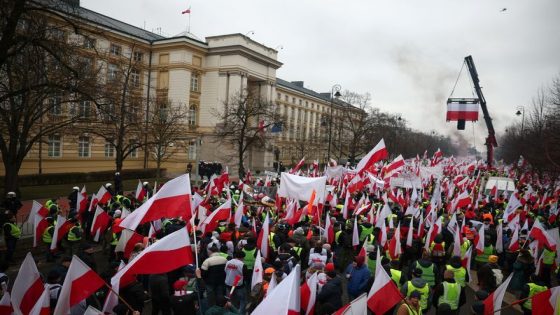WARSAW (Reuters) – Poland’s prime minister pledged to reduce a grain surplus on the domestic market at talks with farmers on Saturday, a government official said, but union leaders said they were pressing on with weeks of protests.
Prime Minister Donald Tusk held three hours of talks in Warsaw with the farmers, who are demanding a halt to cheap imports and to environmental regulations they say harm their livelihoods.
“The premier told the farmers there will be money available to take several million tons of grain off the market,” Deputy Agriculture Minister Michal Kolodziejczak told reporters, suggesting a cut of 4-5 million tons had been proposed. But Tomasz Obszanski, leader of the NSZZ RI Solidarnosc union for individual farmers, said after the meeting that the protests would continue and would be stronger.
“In reality we left the meeting with nothing,” he told reporters.
Andrzej Sobocinski, a farmer from northern Poland, told reporters after taking part in the meeting that dealing with the surplus was not enough.
“If grain keeps flowing from Russia and other countries the problem will persist,” Sobocinski said.
Farmers across the European Union have been calling for changes to restrictions placed on them by the bloc’s Green Deal plan to tackle climate change, and for the re-imposition of customs duties on imports of agricultural products from Ukraine that were waived after Russia’s invasion in 2022.
Farmers from neighboring Poland, Hungary and Slovakia, all of which are members of the EU, say the move undercut their prices. Ukraine is not part of the 27-member EU.
Poland has called for an EU ban on imports of Russian and Belarusian agricultural products.
In Warsaw, protests by tens of thousands of farmers and their supporters ended in violent clashes with police this week, and the protesters warned they would bring Poland to a standstill.
The farmers’ leaders had hoped to hold talks with Tusk on Tuesday but said their request was turned down. Tusk, however, invited them to talks on Saturday.
The protests, including blockades of Ukrainian border crossings and disruptions at ports and on roads, have posed a challenge for the new government led by Tusk.
He faces a balancing act, seeking to address farmers’ concerns while maintaining Warsaw’s staunch support for Kyiv in a year when local and European elections will be held.
(Reporting by Marek Strzelecki, Editing by Timothy Heritage)
Source Agencies



